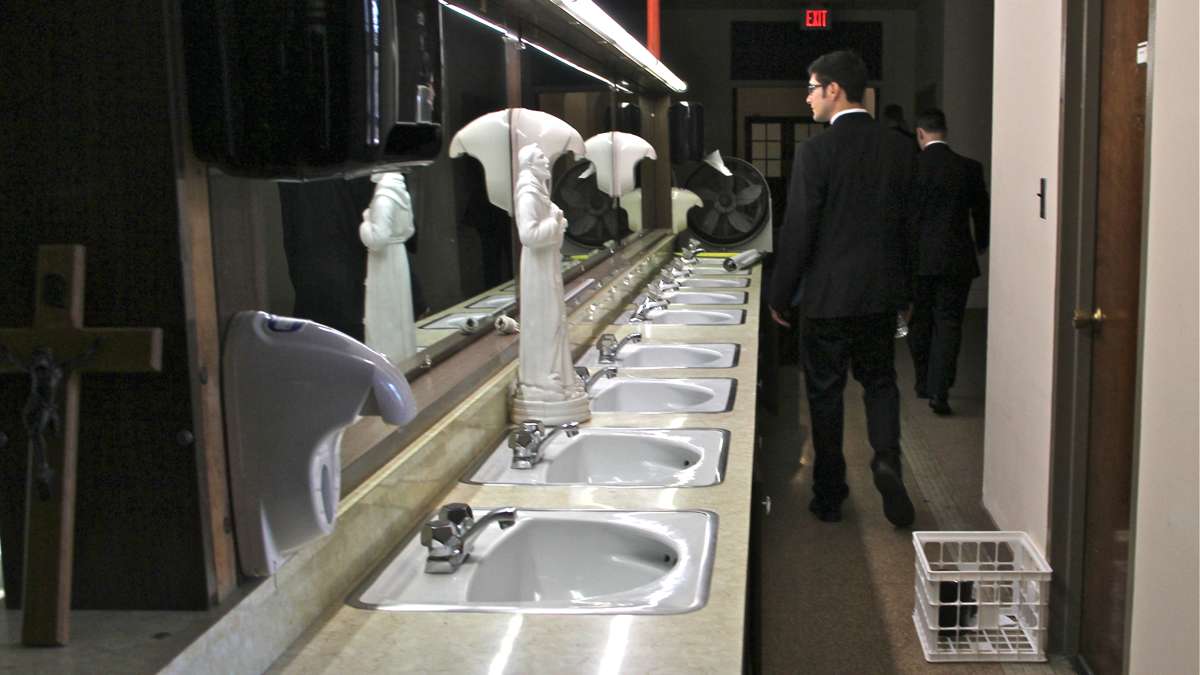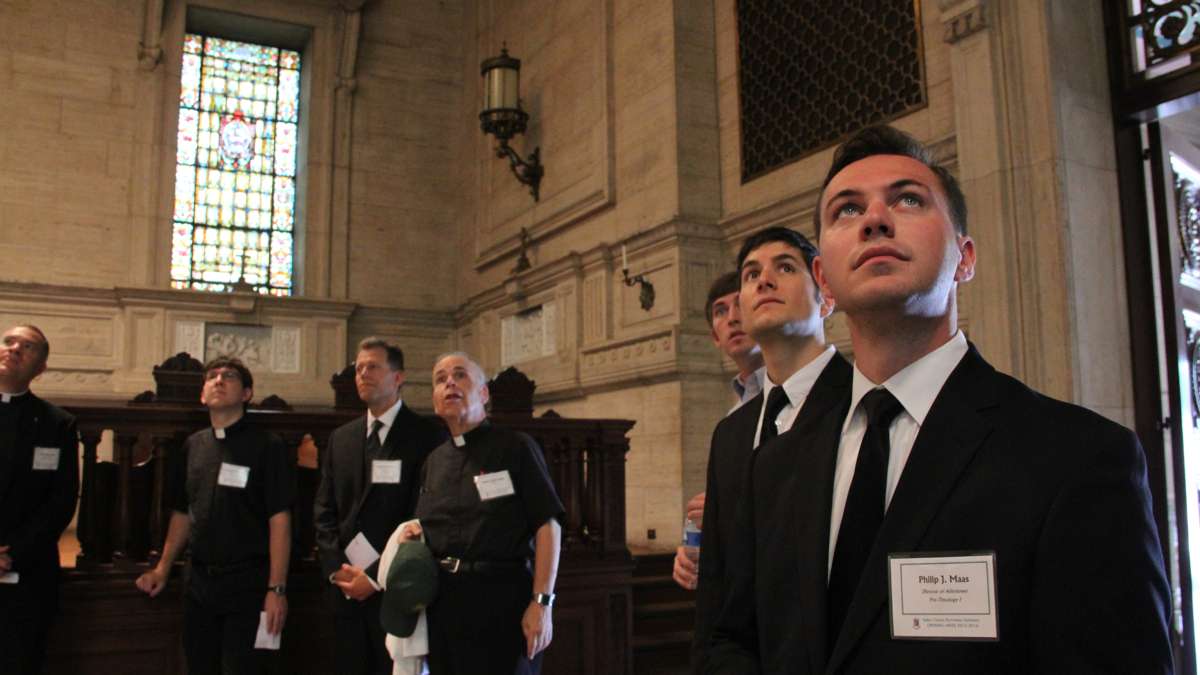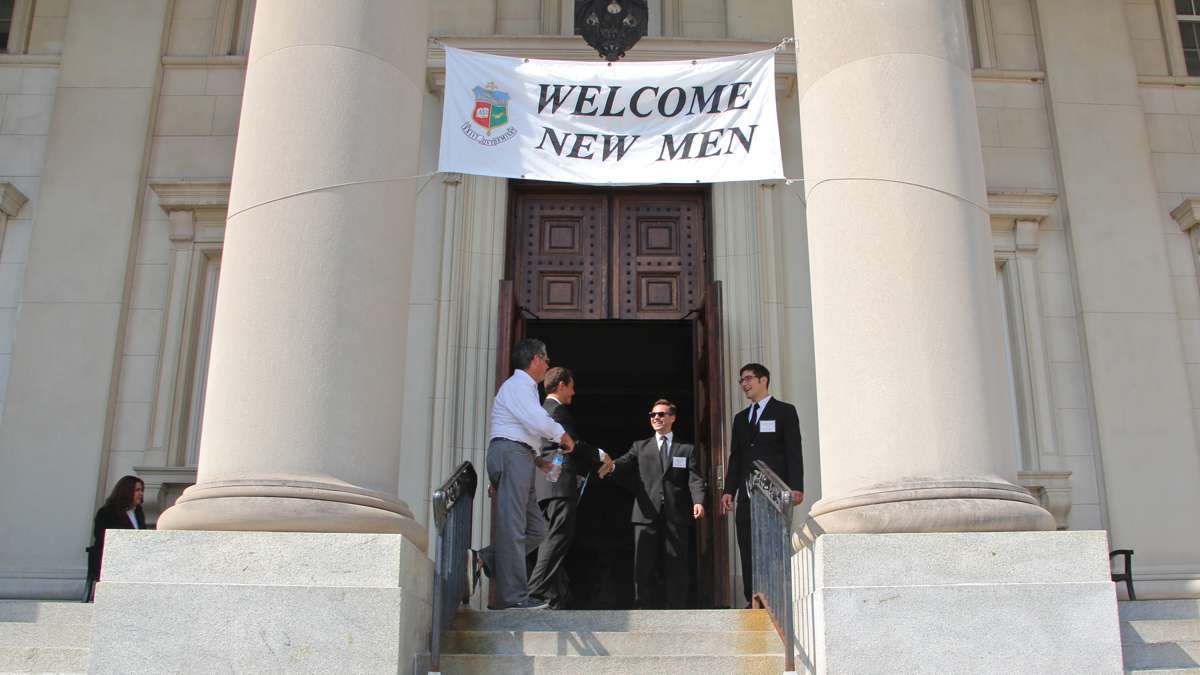‘Francis effect’ is helping revive interest in priesthood
ListenThe number of men in Philadelphia and South Jersey seeking to become Catholic priests took a dive in the mid-2000s when the church was rocked by the clergy-sex abuse scandal. However, that trend is starting to reverse itself, and some claim it’s thanks to a phenomenon known as “the Francis effect.”
Five years ago, the Rev. Michael Romano was happily serving as a parish priest in South Jersey when the Bishop of Camden gave him a new assignment. He was told he’d be the diocese’s vocation director — the guy in charge of recruiting new men who felt called to the priesthood.
Romano begrudgingly accepted his new job.
“When I started, it was a little depressing,” he remembered, looking out the large window of his office in Camden with a view across the Delaware River to the Philadelphia skyline.
Morale was low in the church following the scandals, as well as a slew of parish and parochial school closures and consolidations. At that time, the Diocese of Camden was sending only one or two new guys to seminary each year.
“And then, all of a sudden, in the summer of 2013 into the fall of 2013, more men started making contact with me,” Romano said.
They began showing up at his monthly meetings for those considering the priesthood. At first, just four or five guys came, then eight. By last year, the group was averaging a dozen each month.
This year, nine men from the Diocese of Camden are starting seminary. It’s the diocese’s largest crop of new seminarians since 2000.
The Diocese of Allentown and Archdiocese of Philadelphia are also seeing a significant increase in new vocations over last year. Five men from Allentown and 20 from Philadelphia start seminary at St. Charles Borromeo in Wynnewood, Pennsylvania, this week. For Philadelphia, it’s a three-fold increase from the 2013-2014 school year.
So what’s changed?
Francis’ election, interest in vocations
Pope Francis was elected in March 2013 and, after years of bad press, the popular pontiff is getting positive headlines for the church.
The Archdiocese of Philadelphia’s vocation director, the Rev. Stephen DeLacy, believes the bump in new seminarians has a lot to do with that. He calls it “the Francis effect.”
DeLacy didn’t coin that term — it’s also the name of a documentary about the first year of Francis’ papacy — but “the Francis effect” has become shorthand for a shift in attitude toward the Catholic Church.
“He’s not changing any of the dogma, but he’s dynamic in his ability to outreach, which then stirs up in the heart of young men — especially those that are called to the priesthood — this capability that the church is relevant, the church can be dynamic today,” said DeLacy.
He confesses to using Pope Francis’ plans to visit Borromeo and meet with seminarians when he comes to Philadelphia next month as a recruitment tool this year.
But is the pontiff really prompting more men to join the priesthood?
“I’m certain that the inquiries have definitely increased because of him,” said the Rev. Chuck Frederico, vocation director for the Maryland and Northeast Provinces of the Society of Jesus, the order of priests known as “the Jesuits” of which Pope Francis is a member.
In the last two years, his office went from getting two inquiries a week at most to as many as seven a week. Those most serious about exploring a vocation tell him the pope has motivated them, Frederico said.
“He encourages them to take on something they’ve already been feeling,” he said. “I think they’re inspired by his call to service.”
‘It has definitely increased my excitement’
Others see a more indirect connection.
After years of thinking and praying about it, Philip Maas, 24, of Allentown, has decided to start seminary at Borromeo this year. It’s a decision that stretches back to the playground at his Catholic elementary school when he just blurted out to a friend that he might become a priest one day.
Maas said he’s heard the term “Francis effect” used among Catholics and, though he’s not quite sure what it means, he said Pope Francis’ popularity has made a difference for him.
“It has definitely increased my excitement about the decision to go [into seminary] just because it is a very interesting time in the world definitely and an exciting time in the church,” he said.
Giuseppe Esposito feels the same way. He is returning to seminary this week after a long hiatus as a nurse in the step-down ICU at Good Shepherd Hospital in Allentown.
Esposito’s co-workers were big fans of Pope Francis, which made it easier to tell them he was leaving nursing to become a priest.
“It kind of gave me an ‘in’ to talk about my faith to people who wouldn’t normally bring it up,” he said.
Church leaders see the increase in new seminarians as a positive sign, but they’re not declaring victory in reversing a long-term priest shortage.
In the 1950s and ’60s, the Catholic Church couldn’t build seminaries fast enough to accommodate all the men who felt called to be priests. Today, those priests are retiring and dying, and many of the churches they served are closing.
“It’s not that we don’t have priests going into the future. We do, but it’s only about one-third as many as we would need to compensate for those that entered 50, 60 years ago,” said Mary Gautier.
Gautier has been watching these trends on a national level for about 20 years as a senior associate at the Center for Applied Research in the Apostolate at Georgetown University. She has noticed a slight uptick in the number of first-year seminarians nationwide, but not enough to be statistically significant.
“It serves no purpose to be overly optimistic,” she said.
Challenges continue
Entering seminary is just one step in a long process called “discernment,” and not everyone makes it to ordination day.
This is the challenge facing vocation directors such as Father Romano in Camden who have been working for years to recruit more priests with group meetings, special events, bicycle pilgrimages and “come and see” weekends to give those on the fence an idea of what seminary is like.
Romano is hesitant to pin his hopes on the “Francis effect” because there are many reasons why men do — or don’t — act upon a call to the priesthood.
“It is harder in a society that would not embrace this lifestyle, and I think that makes the decision that much harder for young men,” Romano said. “Oftentimes the first reaction of a guy if the thought comes into his head is to think something’s wrong with him or to be embarrassed about it.
“Back certainly 50 years ago, 60 years ago, it was something you that were so proud of.”
Romano’s job probably isn’t getting any easier, but he’s thankful for a bit of good news for a change.
WHYY is your source for fact-based, in-depth journalism and information. As a nonprofit organization, we rely on financial support from readers like you. Please give today.








